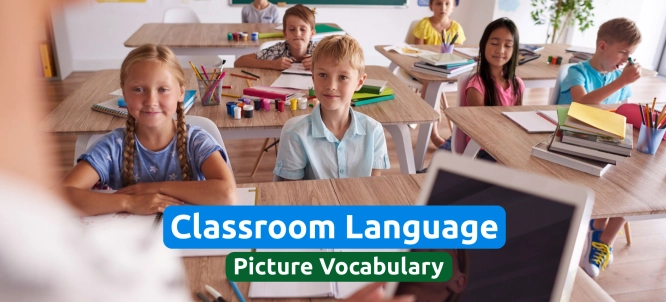by PushtoLearn
Classroom language
Table of Contents
Classroom Language - A1 Exercises
These exercises focus on Classroom Language vocabulary
1. Common Phrases for Students
These are phrases students can use to interact with teachers or classmates in a polite and clear way.
|
Phrase |
When to Use It |
|
Excuse me. |
To politely get the teacher's attention. |
|
Can I go to the restroom? |
To ask for permission to use the bathroom. |
|
I don’t understand. |
To let the teacher know you need help or clarification. |
|
Can you repeat that, please? |
When you didn’t hear or understand something. |
|
May I have a pencil/paper? |
To ask for a needed item. |
|
How do you spell that? |
To ask about the spelling of a word. |
|
Can I sit here? |
To check if a seat is available. |
|
I’m finished. |
To let the teacher know you completed your work. |
|
Can you help me? |
To ask the teacher or a friend for assistance. |
|
What does this mean? |
To ask about the meaning of a word or sentence. |

2. Teacher Instructions
Teachers often give directions to help students understand what to do in class. Here are common teacher instructions and what they mean.
|
Instruction |
What It Means |
|
Please sit down. |
Find your seat and sit. |
|
Be quiet, please. |
Stop talking and pay attention. |
|
Listen carefully. |
Pay close attention to what is being said. |
|
Raise your hand. |
Lift your hand to show you have a question or answer. |
|
Take out your books. |
Get your books out and open them. |
|
Work in pairs/groups. |
Work with a partner or in a small group. |
|
Stand up. |
Get up from your seat. |
|
Line up, please. |
Stand in a line, often to leave the room. |
|
Write this down. |
Copy the information onto paper or in your notebook. |
|
Open your notebook. |
Get your notebook and open it to a blank page. |
|
Pay attention. |
Focus on what the teacher is saying or doing. |
|
Repeat after me. |
Say what the teacher says, often for practice. |
3. Classroom Objects
Knowing the names of classroom objects helps kids ask for things they need or follow directions involving these items.
|
Object |
Description |
|
Pencil |
A tool for writing or drawing. |
|
Eraser |
A small item to remove pencil marks. |
|
Notebook |
A book of blank pages for writing notes. |
|
Textbook |
A book with lessons and exercises used for learning. |
|
Whiteboard |
A board that teachers write on with markers. |
|
Marker |
A thick pen used for writing on whiteboards. |
|
Ruler |
A tool for measuring or drawing straight lines. |
|
Scissors |
A tool for cutting paper. |
|
Crayons |
Colorful sticks for coloring and drawing. |
|
Glue Stick |
Used to stick paper and other items together. |
4. Questions Kids Can Ask in Class
These questions help kids ask for help, directions, or clarification.
|
Question |
When to Use It |
|
Can you explain that again? |
When you need more explanation on a topic. |
|
What page are we on? |
To find the page everyone is working on. |
|
Is this correct? |
To check if your work is right. |
|
Can I answer the question? |
To volunteer to answer. |
|
Where should I write this? |
To know where to write, like in a notebook or paper. |
|
Do we need to write this down? |
To check if notes are necessary. |
|
What does [word] mean? |
To ask the meaning of a specific word. |
|
How much time do we have? |
To find out how long you have to finish an activity. |
5. Useful Words and Phrases for Following Directions
|
Word/Phrase |
What It Means |
|
Circle |
Draw a circle around something on paper. |
|
Underline |
Draw a line under a word or sentence. |
|
Highlight |
Mark important words or phrases with color. |
|
Cross out |
Draw a line through something to show it’s not needed. |
|
Fill in the blank |
Write the correct word or answer in an empty space. |
|
Match |
Connect words or images that go together. |
|
Draw |
Make a picture of something. |
|
Label |
Write the names next to parts of a picture or chart. |
|
Circle the answer |
Put a circle around the right answer. |
Classroom Language Summary Table
|
Category |
Examples |
|
Student Phrases |
"Excuse me," "I don’t understand," "Can you help me?" |
|
Teacher Instructions |
"Please sit down," "Open your books," "Raise your hand" |
|
Classroom Objects |
Pencil, Eraser, Notebook, Whiteboard, Ruler |
|
Student Questions |
"Can you explain that again?", "What page are we on?" |
|
Following Directions |
Circle, Underline, Highlight, Fill in the blank |
Example Sentences Using Classroom Language
-
"Excuse me, can I go to the restroom?"
-
"Please raise your hand if you know the answer."
-
"Can you explain that again? I don’t understand."
-
"We are on page 12 in the textbook."
-
"Underline the verbs in each sentence."
FAQ
What should I say if I don’t understand something?
Say, “I don’t understand” or “Can you explain that again, please?”
How can I politely ask for help?
You can say, “Can you help me?” or “I need help with this.”
What do I say if I want to leave the classroom?
Ask, “May I go to the restroom?” or “May I go outside?”
What does "underline" mean?
It means drawing a line under a word or sentence to make it stand out.
How do I know when it’s okay to speak in class?
Wait for the teacher to call on you after you raise your hand or speak when the teacher invites the class to answer.

